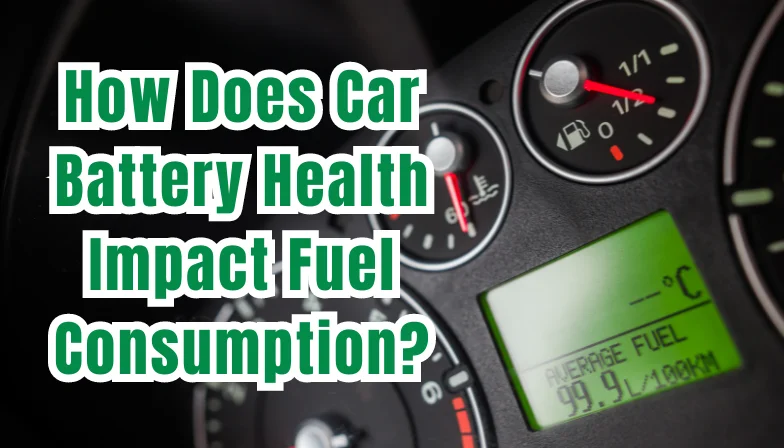Table of Contents
Introduction: The Connection Between Car Battery Health and Fuel Consumption
Have you ever considered the impact of your car’s battery health on your fuel consumption? It’s a crucial aspect for every car owner to understand. Often, this aspect is overlooked, but the state of your battery can significantly influence your car’s performance and your fuel expenses. Maintaining a healthy battery isn’t just about keeping your car in good shape; it’s also a smart way to save on your gas bills.
In this comprehensive guide, we’ll explore how a poorly maintained battery can cause your car to consume more fuel than necessary. It’s not just about ensuring your car runs smoothly; it’s about taking control of your car’s performance and fuel expenses, ensuring you’re not wasting money on extra gas due to a faltering battery.
We’ll dive into the nitty-gritty of how your car’s battery and fuel system work together and why a healthy battery is key to better fuel efficiency. You’ll learn how to spot signs that your battery might be affecting your car’s gas mileage and what you can do to keep both your battery and fuel consumption in check.
So, buckle up and get ready to become more car-savvy! This guide will give you the inside scoop on keeping your car’s battery in top condition to help you save fuel, drive efficiently, and keep a little extra cash in your pocket.
Car Battery Health: The Unsung Hero of Fuel Efficiency
Believe it or not, your car’s battery health is a big deal regarding how much fuel your vehicle uses. It’s like the unsung hero of fuel efficiency. Sure, everyone knows the battery’s job is to start the car, but its role goes way beyond that. It’s the backbone of your car’s electrical system, keeping everything from the lights and radio to the ignition system running smoothly.
But here’s the kicker: when your battery isn’t feeling too good, it doesn’t just struggle to start your car; it can actually make your car guzzle more gas. That’s because a weak battery puts extra pressure on the car’s alternator, and to make up for this, the alternator demands more power from the engine, which in turn uses more fuel.
A healthy car battery ensures that all electronic components in your vehicle, from the ignition system to the fuel injectors, work optimally. These components are integral in achieving a balanced fuel-air mix, ensuring that the engine runs efficiently. A weak battery can cause these systems to malfunction, leading to inefficient engine operation and, consequently, higher fuel consumption.
So, maintaining your car’s battery isn’t just about avoiding the inconvenience of a car that won’t start; it’s also about making sure you’re not burning through fuel faster than you need to. A healthy battery means a more efficiently running car, and that means you get the best bang for your buck at the gas station.
Understanding this connection can help you make smarter decisions about your car’s maintenance, ensuring that you’re not only keeping your vehicle in top shape but also maximizing its fuel efficiency. So, let’s give a round of applause for our car batteries – the unsung heroes in the quest for better fuel efficiency!
The Link Between Car Battery Health and Fuel Consumption
The car’s alternator charges the battery while the vehicle is running. However, if the battery is in poor condition, it can’t hold a charge efficiently. This situation forces the alternator to work harder, which requires more engine power and, ultimately, more fuel.
Moreover, modern vehicles come equipped with an array of electronic systems and sensors that rely heavily on a stable power supply from the battery. When the battery’s health is compromised, these systems might not function as intended, leading to less efficient fuel use and increased emissions.
The Domino Effect of a Failing Car Battery on Fuel Economy
When your car’s battery starts to fail, it’s like knocking over the first domino in a long line, setting off a chain reaction that affects your car’s entire operation, especially how much fuel it uses.
- Increased Alternator Load: Think of the alternator as the device that charges your battery while you drive. If your battery is weak, the alternator has to work overtime to try to keep it charged. This extra effort means the engine has to burn more fuel, leading to increased fuel consumption. Also, this constant strain can wear out the alternator faster, potentially leading to costly repairs down the road.
- Compromised Fuel Injection: Your car’s electronic control unit, or ECU, is like the brain that controls fuel injection — when and how much fuel gets squirted into the engine. If your battery is in bad shape, it can mess with the ECU’s performance, leading to not-so-perfect timing in fuel injection. This inefficiency means your car might use more fuel than it actually needs because the fuel isn’t being used in the most effective way.
- Inefficient Ignition: Here’s where things get really wasteful. If your battery doesn’t have enough oomph, it might not be able to power the ignition system properly. This can lead to incomplete combustion, where all the fuel isn’t fully burned in the engine. Not only does this increase fuel consumption because you’re not getting as much energy out of the fuel as you should, but it also means your car isn’t running as cleanly as it could be, which isn’t great for the environment.
So, keeping your car’s battery in good health is super important, not just for starting your car but also for keeping your fuel consumption in check and making sure you’re not putting unnecessary stress on other parts of your car.
How to Keep Your Car Battery in Top Shape
Making sure your car battery stays healthy is super important, not just for making it last longer but also for helping your car run better and more efficiently. Here’s a more in-depth look at how you can take good care of your car’s battery:
- Regular Check-Ups are Key: Just like you have regular check-ups at the doctor’s, your car battery needs them, too. Set up a schedule for routine battery check-ups, where you or a mechanic can look for any signs of corrosion or damage, clean the battery terminals, and make sure all connections are snug and secure. This can help prevent any minor issues from turning into big problems.
- Keep That Battery Charged: If you leave your car parked without driving it for too long, the battery can lose its charge. Try to drive your car regularly to help the battery stay charged up. If you know you won’t be using your vehicle for a while, consider using a battery maintainer or charger to keep the battery charged without overcharging it.
- Watch Out for the Weather: Batteries don’t like extreme temperatures, whether hot or cold. In the summer, try to park in the shade or an excellent place to protect your battery from overheating. In the winter, parking in a garage or a warmer spot can help prevent your battery from getting too cold, which can drain its power faster.
- Know When It’s Time for a New Battery: Batteries, even the perfect ones, don’t last forever. Most car batteries will need to be replaced every 3 to 5 years, depending on how you use and take care of them. Please keep track of how old your battery is and how it’s performing. If it starts to show signs of wearing out, like taking longer to start the engine or needing to be charged more often, it might be time for a new one. Follow your car manufacturer’s recommendations for when to get a new battery to make sure you’re not left stranded with a dead battery.
By following these tips, you can help ensure that your car battery stays healthy and your car runs smoothly. This means fewer unexpected breakdowns, better performance, and saving money in the long run because you’re taking good care of your car. Plus, knowing how to look after your car’s battery can make you feel more confident and in control as a driver.
A Key Player in Fuel Consumption
It’s clear that car battery health plays a significant role in fuel consumption. A well-maintained battery ensures that all electronic systems in your vehicle function optimally, leading to more efficient fuel use and lower operating costs. By understanding the link between car battery health and fuel efficiency, you can take proactive steps to maintain your vehicle, ensuring it runs smoothly and economically.
Advanced Tips for Keeping Your Car Battery Tip-Top
Taking care of your car battery continues beyond just the regular stuff. If you really want to get the best out of your battery and help your car use less fuel, here are some advanced tips that can make a big difference:
- Smart Charging with a Battery Maintainer: If your car often sits without being driven, a battery maintainer is a cool tool to have. It’s like a smart charger that keeps your battery at the perfect charge level without overdoing it. This way, your battery stays ready to go without getting worn out from overcharging.
- Check Your Car’s Charging System: Just like you need regular check-ups, so does your car’s charging system. Make sure it’s working right by having it checked regularly. If your alternator is charging too much or not enough, it can mess up your battery life and even make your car burn more fuel than it needs to. Keeping the charging system in good shape means your battery stays healthier, and your car can be more fuel-efficient.
- Watch That Electrical Load: When your car’s engine is off, try to keep the use of electrical stuff like the radio, lights, or air conditioner to a minimum. These can really drain your battery if you’re not careful. It’s like leaving all the lights on in your house when you go out; it uses up power for no good reason. By keeping the electrical load down when the engine isn’t running, you help save your battery’s energy for when it really matters, like starting the car and running it efficiently.
By stepping up your battery care game with these advanced tips, you boost your battery’s health and contribute to better fuel economy for your car. It’s all about making sure your car’s battery is in great shape so it can do its job without using up unnecessary fuel. Knowing how to maintain your car’s battery and efficiency can boost your car care confidence.
The Economic and Environmental Impact
Taking good care of your car battery does more than help your vehicle run better; it’s also a smart way to save money and care for our planet. When your battery is in top shape, your car doesn’t have to work as hard, which means it uses less fuel.
Spending less on fuel is great for your wallet, and using less fuel is even better for the environment because it means your car produces fewer emissions. These emissions contribute to pollution and climate change, so by reducing them, you’re helping to make the air cleaner and the earth a healthier place to live.
Moreover, efficient fuel consumption leads to less demand for fossil fuels, a non-renewable resource. This not only helps conserve these valuable resources but also reduces the negative impacts of fuel extraction and transportation.
So, maintaining your car battery’s health is a straightforward yet impactful way to support both your finances and the planet, aligning your driving habits with eco-friendly goals.
Conclusion
Wrapping up, the state of your car battery plays a crucial role in how much fuel your car uses. By taking proactive steps to maintain and monitor your car battery, you’re not just ensuring that your vehicle runs smoothly but also paving the way for a more economical and environmentally friendly driving experience.
Paying a bit of attention to your car’s battery health can lead to significant savings on fuel costs, which is good news for your budget.
Moreover, every time you drive with a well-maintained battery, you’re contributing to a cleaner environment by reducing the harmful emissions your car releases. It shows how a little care and maintenance can have a big impact, not just on the performance and efficiency of your car but also on your pocketbook and the planet.
Maintaining the health of your car battery, therefore, is an investment in your vehicle’s performance, your wallet, and the environment.
By understanding and acting on the importance of car battery health, you can ensure that your car runs as efficiently as possible, showcasing the undeniable impact of car battery health on fuel consumption and environmental sustainability.
Please note that this post contains affiliate links. This means if you click on a link and make a purchase, we may receive a small commission at no extra cost to you. Our reviews and recommendations are based on our own opinions and analysis, and we aim to provide you with the most accurate and helpful information to make your decisions. Your support helps us continue to provide valuable content. Thank you for your understanding and support.




